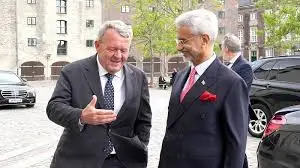Sanctioned terrorists on Pakistan soil, its govt cannot say no idea: Jaishankar

New Delhi, May 2025:
India’s External Affairs Minister S. Jaishankar has once again highlighted a critical issue. He pointed out that sanctioned terrorist groups continue to operate from Pakistani soil. Speaking at a recent diplomatic forum, Jaishankar said Pakistan’s government cannot deny knowledge of these groups.
This statement comes amid India’s ongoing efforts to expose cross-border terrorism. It is a serious threat to peace and security in South Asia. Jaishankar’s comments also reflect India’s push for global awareness. He urged Islamabad to take concrete action against these terror networks.
Terror Groups Remain Active Despite Sanctions
Terrorism has long been a barrier in India-Pakistan relations. Several groups, many sanctioned internationally, still operate from Pakistan. These organizations have targeted Indian civilians and security forces repeatedly. As a result, hundreds have lost their lives, and disruption continues.
Jaishankar stressed that Pakistan cannot feign ignorance. “The presence of sanctioned terrorists on Pakistan soil is a fact,” he said. He also added that the government there must take responsibility. It is crucial to stop these groups from operating freely.
India has submitted evidence to international bodies linking attacks to Pakistan-based terrorists. However, Islamabad has not made significant progress in curbing these activities. Instead, India accuses Pakistan of providing safe havens and logistical support. This assistance enables terrorists to plan and execute attacks.
India Seeks Greater International Pressure on Pakistan
Jaishankar’s remarks highlight India’s diplomatic efforts. India aims to build international pressure on Pakistan to fight terrorism effectively. It calls on the global community to recognize Pakistan’s role in harboring terrorists. Many countries have expressed concern about cross-border terrorism and its impact on regional stability.
Moreover, some nations have imposed sanctions on terrorist individuals and groups. These align with India’s position. However, India insists that sanctions alone are insufficient. Pakistan must take real steps on the ground to dismantle terrorist infrastructure. Without this, mere verbal condemnations will not end the threat.
Impact on Bilateral Relations and Regional Stability
Cross-border terrorism has repeatedly undermined India-Pakistan relations. Despite several peace initiatives, terror attacks originating from Pakistan have shattered trust. Jaishankar said peace talks cannot move forward without Pakistan’s action. The dismantling of terror camps and stopping militant support are essential.
Terrorism also threatens the broader stability of South Asia. It puts millions at risk and hinders economic progress. Therefore, Jaishankar called for a united international approach to fight terrorism. Cooperation between nations is vital for lasting peace.
India’s Commitment to Counterterrorism
India remains committed to fighting terrorism in all forms. Jaishankar reiterated the importance of global collaboration. He emphasized intelligence sharing and joint law enforcement efforts. Cutting off financial networks that fund terrorism is also critical.
Furthermore, Jaishankar urged Pakistan to honor its international commitments. This includes abiding by UN resolutions related to terrorism. India seeks cooperation to bring terrorists to justice and ensure accountability.
Meanwhile, India’s security forces continue to strengthen border defenses. They are working hard to prevent infiltration and terror strikes. Combined with diplomatic pressure, these efforts form India’s core strategy.
International Response and Future Outlook
The global reaction to Jaishankar’s comments has been largely positive. Many countries recognize the need to tackle terrorism more effectively. Experts believe that international sanctions and diplomatic pressure can influence Pakistan. However, real change depends on political will within Pakistan.
Pakistan’s reluctance to act decisively remains a challenge. This hampers efforts to stabilize the region. India continues to advocate for a peaceful South Asia, free from terrorism. Jaishankar’s statement reminds the world that ignoring terror safe havens is unacceptable.
Accountability is necessary to achieve lasting peace. Pakistan must be held responsible for groups operating within its borders.
Conclusion
External Affairs Minister S. Jaishankar’s firm statement underscores India’s stance on terrorism. Pakistan cannot claim ignorance about terrorists on its soil. India is stepping up diplomatic efforts to hold Pakistan accountable.
The international community plays a crucial role in supporting India’s call for action. Without Pakistan’s cooperation, peace in the region will remain distant. India remains determined to fight terrorism and seek meaningful dialogue. However, peace is only possible when terrorism is eliminated.






